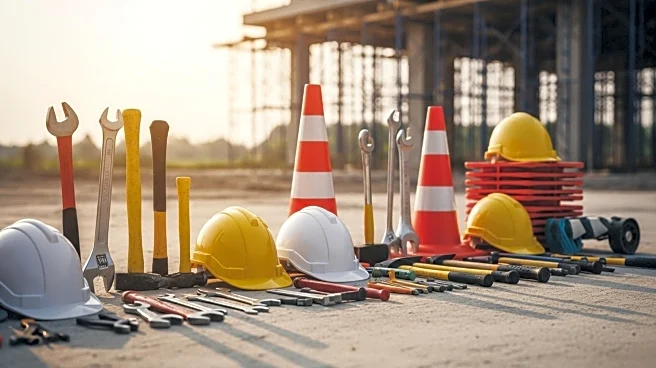What's Happening?
The construction industry is experiencing a significant increase in job openings, with a 26% rise in unfilled positions at the end of July compared to the previous month, according to the Bureau of Labor Statistics. This surge in job vacancies, totaling 306,000, represents a 33.6% increase from July 2024. The industry is facing challenges in finding workers, exacerbated by immigration crackdowns. Anirban Basu, chief economist for Associated Builders and Contractors, notes that the rise in job openings is likely due to immigration policies affecting the labor force rather than increased demand for construction workers. The labor market is tight, with layoffs reaching their highest level since early 2023, indicating a deterioration in industry-wide labor demand.
Why It's Important?
The labor shortage in the construction industry has significant implications for the U.S. economy and infrastructure development. The inability to fill positions can lead to project delays, impacting economic growth and the timely completion of essential infrastructure projects. The tension between labor demand and supply highlights the challenges firms face in recruiting qualified workers, which can affect productivity and competitiveness. The situation underscores the need for policy adjustments to address immigration issues and support workforce development in the construction sector. The broader economic impact includes potential slowdowns in construction activity, affecting related industries and overall economic stability.
What's Next?
The construction industry may continue to face challenges in recruiting workers unless immigration policies are adjusted to ease the labor shortage. Firms might need to explore alternative strategies, such as investing in workforce training and development, to mitigate the impact of the labor gap. Policymakers could consider revising immigration regulations to support the industry's labor needs. The ongoing labor shortage may prompt discussions among industry leaders and government officials to find solutions that balance immigration policy with economic growth and infrastructure demands.
Beyond the Headlines
The labor shortage in the construction industry raises ethical and legal questions about immigration policies and their impact on the workforce. The reliance on foreign-born workers highlights the need for a comprehensive approach to immigration reform that considers the economic contributions of these workers. Long-term shifts in labor market dynamics may require industries to adapt to changing workforce demographics and explore innovative solutions to attract and retain talent.











